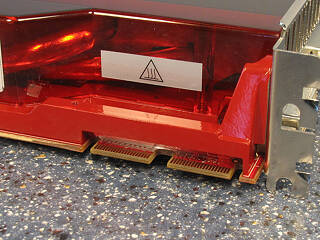 27
27
Diamond HD 4870 512 MB GDDR5 Review
Test Setup »A Closer Look
The cooler consists of a copper baseplate that makes direct contact with the GPU and an aluminum array of cooling fins. Both are connected by a heatpipe to ensure optimum heat transfer. Compared to the HD 4850 the cooler is heavier and more complex. In addition to cooling the GPU, the cooler also cools the eight memory chips and the voltage regulator circuitry.
You can use two, three or four of these HD 4870 cards in CrossFire to build an even more powerful rig.
Power to the card is supplied via two 6-pin PCI-Express power connectors, the card will not POST without power or just one power connector connected to it. I found the two connectors to be a bit too close together, which makes it harder to plug in the connectors when the card is installed in the system.
Yum, yum.. nice GDDR5 memory chips. They are made by Qimonda (formerly Infineon) and have the model number IDGV51-05A1F1C-40X. The 40X stands for the data rate of 4.0 Gbps per pin. Effectively this means that chips are rated at 1000 MHz real clock. Please note that GDDR5 offers twice the bandwidth per pin at the same clock than GDDR3/4. So a 256-bit GDDR5 card has the same bandwidth as a 512-bit GDDR3 card at the same clock. This is a key factor in keeping design costs down. As you know NVIDIA uses a 512-bit memory bus on the GTX 280 which dramatically increases total cost. ATI gets the same memory bandwidth with a 256-bit GDDR5 bus at a fraction of the price.
Unlike the NVIDIA GT200, the AMD RV770 GPU is not that big with a die size of 256 mm². Just like all other ATI GPUs the GPU is made at TSMC in a 55nm process.
Mar 11th, 2025 19:38 EDT
change timezone
Latest GPU Drivers
New Forum Posts
- Silent Hill Series Discussion/Speculation thread (2)
- Post your Old CDs, from back in the day thread. (47)
- Help me to optimize my new laptop (0)
- Nvidia's GPU market share hits 90% in Q4 2024 (gets closer to full monopoly) (845)
- I need a BIOS for the "Rx580 8gb" chip 215-0876406 (9)
- intel 1700 with high speed ram,memory (44)
- The TPU UK Clubhouse (25872)
- Technical Issues - TPU Main Site & Forum (2025) (75)
- RTX 5090 ridiculous price! (206)
- RX 9070 availability (187)
Popular Reviews
- Sapphire Radeon RX 9070 XT Nitro+ Review - Beating NVIDIA
- XFX Radeon RX 9070 XT Mercury OC Magnetic Air Review
- AMD Ryzen 9 9950X3D Review - Great for Gaming and Productivity
- ASUS Radeon RX 9070 TUF OC Review
- MSI MAG B850 Tomahawk Max Wi-Fi Review
- NVIDIA GeForce RTX 5070 Founders Edition Review
- AMD Ryzen 7 9800X3D Review - The Best Gaming Processor
- Corsair Vengeance RGB CUDIMM DDR5-8800 48 GB CL42 Review
- ASUS GeForce RTX 5070 Ti TUF OC Review
- MSI GeForce RTX 5070 Ti Gaming Trio OC+ Review
Controversial News Posts
- NVIDIA GeForce RTX 50 Cards Spotted with Missing ROPs, NVIDIA Confirms the Issue, Multiple Vendors Affected (513)
- AMD Radeon RX 9070 and 9070 XT Listed On Amazon - One Buyer Snags a Unit (261)
- AMD RDNA 4 and Radeon RX 9070 Series Unveiled: $549 & $599 (260)
- AMD Mentions Sub-$700 Pricing for Radeon RX 9070 GPU Series, Looks Like NV Minus $50 Again (248)
- NVIDIA Investigates GeForce RTX 50 Series "Blackwell" Black Screen and BSOD Issues (244)
- AMD Radeon RX 9070 and 9070 XT Official Performance Metrics Leaked, +42% 4K Performance Over Radeon RX 7900 GRE (195)
- AMD Radeon RX 9070-series Pricing Leaks Courtesy of MicroCenter (158)
- AMD Radeon RX 9070 XT Could Get a 32 GB GDDR6 Upgrade (100)






